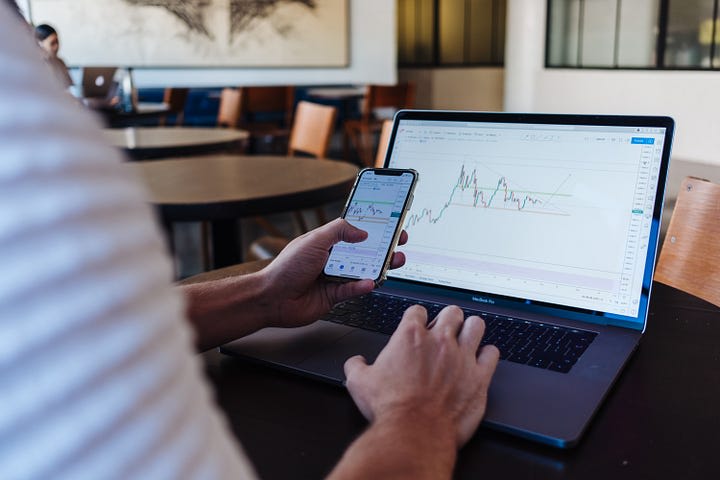
Exactly one year ago, I started tracking every dollar I spent, and it ended up being a huge game-changer.
I first started tracking every dollar because I noticed that my savings had plateaued. Even though I was making money, by the next month I would check my bank account, and say to myself, “Oh no. Where has it gone?”
I would end up spending almost all of what I earned, if not more, and end up right back where I was the month before. I realized that I needed to start tracking my money in order to start seriously saving. So I did.
Little did I know, that tracking every dollar would help me go from being unemployed and miserable to financially skyrocketing, within 12 months.
My savings and life wouldn’t be anywhere near where they are now if it wasn’t for doing these four things:
1. Start tracking everything.

This is the excel sheet I used to track all of my money. (This one is using example numbers).
All I tracked was money going in and out. For example, $1070 going in, $1000 going out, leaving $70 to save.
At the end of every month, I would write down how much money I had total in my bank account, and put that underneath this sheet. I would also compare how much my savings grew by the previous month.
I quickly realized that I should’ve done this a long time ago.
After I tracked my first month, I was suddenly aware of what was really going on, which allowed me to have much more control of the amount I was saving.
After I tracked my first month, I was suddenly aware of what was really going on, which allowed me to have much more control of the amount I was saving.
“Measurement is the first step that leads to control and eventually to improvement. If you can’t measure something, you can’t understand it. If you can’t understand it, you can’t control it. If you can’t control it, you can’t improve it,” — Dr. H. James Harrington
Tracking your money will help you assess the current situation, which will help you to become much more aware and accountable for your decisions and spending habits, which will lead you to improve them as time goes on.
2. Prioritize your vices

We are all aware of the guilty pleasures of frivolous spending. Whether it’s a coffee at Starbucks before work, buying clothes online, or going out to eat every day, we all have our vices- and that's okay, as long as everything is not your vice.
Examine what you are spending your money on, pick a couple of categories that you think are completely worth it, and cut the others right out.
I realized that these purchases were relatively easy to cut out:
- Clothes. Most people that I know, including me, already have more than enough clothes. People often shop just to feel fresh and new. That’s all fine and dandy, but so is having a fat stack in your bank account. If you completely run out of socks, fine, go buy some online. But the truth is, nobody will ever notice if you don’t buy new clothes. I didn’t buy clothes for an entire year, and guess what? Nothing happened! (I saved money- that’s what happened).
- Coffee. I love buying coffee out at Starbucks, who doesn’t? But, a Keurig machine or a french press will pay for itself in no time, and it’s fun to become your own coffee barista. Buy a portable mug and bring your coffee with you instead of buying it out. Make your coffee at home and BOOM- another expense is gone.
- Subscriptions. Subscriptions are like little elves that steal from your wallet at night. Lock your doors, don’t let them in! (And while you’re at it, cancel your dang subscriptions!) You don't need Netflix, Amazon Prime, Hulu, Spotify, etc. I use Youtube for entertainment and music and pay for shipping for something on Amazon if I really need to buy something. If you can’t survive without one, then pick ONE subscription you want, and cancel the rest.
- Dining out. Making meals at home and meal prepping is one of the best well-known ways to save money. Going out is an experience worth having once in a while, but when you fall into the habit of doing it all the time, it will be much harder to save at your full potential.
- Going to bars. This is something I spent a lot of money on when I first started tracking my expenses. Buy a bottle for your house and have a movie night at home instead of going bar hopping. If you can do this, you are already way ahead of the game. When you do end up going out to a bar, have a drink beforehand and only get one drink when you are there.
Prioritize your vices and leave a couple of expenses that truly improve your life. You will still be able to live the life you want while saving money.
3. Predict where you will be in a year

After a couple of months of tracking your income and expenses, you will eventually notice a pattern of how much you are saving on average. You now have a pretty good idea of what to expect in the coming months.
Take the average of how much you save per month, and see where you would be in one year, or five.
You will realize that a couple of dollars saved or a couple of dollars earned per month does in fact make a big difference:
- If you save an extra $100 a month: In one year you will have $1,200. In five years you will have $6,000, or around $8,000 if you invested with a 10% return.
- If you save an extra $300 a month: In one year you will have $3,600. In five years you will have $18,000, or around $24,000 if invested with a 10% return.
Motivating, right?
Add your average monthly savings to the amount you have saved up, and predict where you will be in the future. You might surprise yourself with what you come up with, and what you are suddenly capable of doing.
Looking at the future numbers will make it a lot easier to stay consistent and stay motivated. It will also make it easier to say no to the splurging activities, and yes to the saving opportunities.
4. Invest your savings

After saving a decent amount, I moved onto the next logical step, investing. By investing your savings, instead of having your money just sit in a savings account, your money will be making you more money.
Many financial experts will recommend that you put in 10–15% of your income into a Roth IRA or if you have a company that provides it, a 401k.
Simply stated, both of these are retirement accounts that allow you to easily gain wealth over time but they are meant to not be touched until retirement.
A more in-depth explanation:
- “A Roth IRA is a special retirement account where you pay taxes on money going into your account, and then all future withdrawals are tax-free.”
- “A 401k plan is a tax-advantaged retirement account offered by many employers to their employees. Workers can make contributions to their 401k accounts through automatic payroll withholding, and their employers can match some or all of those contributions. The earnings in a 401k plan are not taxed until the employee withdraws that money, typically after retirement.”
- “A Roth 401k plan is a tax-advantaged retirement savings plan that combines features from traditional 401k plans and Roth IRAs, and withdrawals can be tax-free.”
By contributing to either a Roth IRA or a 401k every month, your savings will earn compound interest, meaning that your interest will earn interest, allowing your earnings to expand exponentially.
“If you contribute $6,000 to an IRA every year ($500 a month) for 40 years, your total investment would be $240,000.
But because of the power of [compound interest], your investment would grow to more than $1.37 million, assuming a 7% return. And you’d be a millionaire by age 57, just by saving $500 a month.” — How to become a millionaire, Investopedia.
(This is if you start at 17. You would get the same result after 40 years regardless of when you start.)
Although you can still invest for fun and invest for retirement, with these options, you are forcing yourself to save for retirement and not giving yourself an option to cash out until then. Your future self will surely thank you.
I recommend that you do your own research and have at least 6–8 months worth of expenses before you start investing.
Saving money takes effort, self-restraint, consistency, and time. By tracking your savings, prioritizing your vices, looking towards the future, and investing your savings, reaching your financial goals may be a lot more attainable than you think. Start small and stay consistent. You got this!
About the Creator
Serena
Hi! I am a ✦25-year-old digital nomad✦ Writing about Remote Work, Personal Development, and Productivity.






Comments
There are no comments for this story
Be the first to respond and start the conversation.